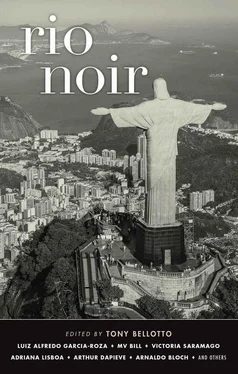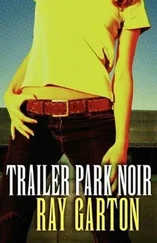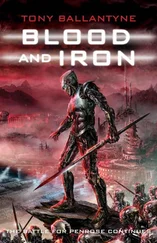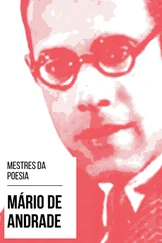Tony Bellotto - Rio Noir
Здесь есть возможность читать онлайн «Tony Bellotto - Rio Noir» весь текст электронной книги совершенно бесплатно (целиком полную версию без сокращений). В некоторых случаях можно слушать аудио, скачать через торрент в формате fb2 и присутствует краткое содержание. Город: New York, Год выпуска: 2016, ISBN: 2016, Издательство: Akashic Books, Жанр: Детектив, на английском языке. Описание произведения, (предисловие) а так же отзывы посетителей доступны на портале библиотеки ЛибКат.
- Название:Rio Noir
- Автор:
- Издательство:Akashic Books
- Жанр:
- Год:2016
- Город:New York
- ISBN:978-1-61775-312-1
- Рейтинг книги:4 / 5. Голосов: 1
-
Избранное:Добавить в избранное
- Отзывы:
-
Ваша оценка:
- 80
- 1
- 2
- 3
- 4
- 5
Rio Noir: краткое содержание, описание и аннотация
Предлагаем к чтению аннотацию, описание, краткое содержание или предисловие (зависит от того, что написал сам автор книги «Rio Noir»). Если вы не нашли необходимую информацию о книге — напишите в комментариях, мы постараемся отыскать её.
, the Akashic Noir Series delves for the first time into South America.
Rio Noir — читать онлайн бесплатно полную книгу (весь текст) целиком
Ниже представлен текст книги, разбитый по страницам. Система сохранения места последней прочитанной страницы, позволяет с удобством читать онлайн бесплатно книгу «Rio Noir», без необходимости каждый раз заново искать на чём Вы остановились. Поставьте закладку, и сможете в любой момент перейти на страницу, на которой закончили чтение.
Интервал:
Закладка:
One day, he called me to his apartment. He opened the door with a smile I had never seen. He was in ecstasy, Georges. He told me to sit down and handed me a brown package. “The finished manuscript,” he said. It was light but weighed heavy in my hands. You can imagine, I was very nervous. I started to open the package to look at some of the pages but he took it away and said it wasn’t for me to read. He just wanted to celebrate. I was really pissed. I insisted he at least let me see the title. But Georges was seductive and knew how to please. He said I was listed in the acknowledgments and changed the subject. We opened a bottle of wine and ordered sandwiches. No matter how much I talked about other things, all I wanted was to read the book. And there came a moment when I looked at him in the rocking chair and thought that I really wanted to be like him, that I wanted to publish a book as good as his. I would never be able to. We have to be aware of our limits. There is such a thing as talent, you know?
One idea leads to another. Before I realized it, I had returned to my apartment with the excuse of taking some medication and now I had the vial of mecicitronine in my hand. I went back downstairs in time to open the bottle of wine with him and pay for the sandwich delivery from Cervantes. By now you’ve got the picture: Georges didn’t die of a heart attack; I killed him. I put the poison in his sandwich and he didn’t notice the bitter taste because of the pineapple. You can call it insanity, obsession, anything you like, but I needed to read that book. More than that, I needed to publish that book under my name and be successful, a fucking winner.
Georges was old, tired of life. I feel I did him a favor. And myself as well. Georges ate that last sandwich with gusto. He choked, hiccupped, died. In the rocking chair. The glass shattered on the floor. I saved the package from the pool of red wine and didn’t even wait for him to stop moaning. I took out the manuscript: The Story of Georges Fullar.
Chapter One: His name. My name. An elderly writer meets a younger one, full of dreams and ambition. The older writer is tired of life, thinks about suicide, but the youth’s vitality does him good.
Chapter Two: The two converse and become friends. The veteran decides to test the limits of the younger man: he sees if he is capable of killing a woman. And of course the two do kill the woman. This happens in Chapter Five and is beautiful, poetic, tense. Their friendship grows, but the old man stays interested in the ethical boundaries of his junior. The old man tells him that he has finished the book but denies him access to the text. The youth can’t resist and kills the old man. Kills from envy, from pity, to steal the work. People don’t need a motive for killing. He kills him with a knife, not with poison in a sandwich from Cervantes. Georges was wrong about that; I was smarter. At the end comes the letter. The letter in which the old man explains to the youth that he knew he would be murdered, that he knew the other couldn’t contain his curiosity, and that the younger man must do with the book what he considers appropriate now.
Do you realize what a stroke of genius this is? Metalanguage at its best. Well written, well structured, I’m never going to accomplish anything like that. I thought about it for days. I saw them take away Georges’s body. I even went to the funeral — there was hardly anyone there. Dead of a heart attack, said the newspapers. I wanted to publish his book under my name, but I can’t. I need to tell everything so people will know what really happened. It’s our story. He wrote our story. The truth is all there. You can arrest me, Detective Aquino. And release what I just told you to the press, to the world. I’m not doing it for myself; I’m not doing it for Georges either. I’m doing it for mystery writing. It’s one helluva book, and it needs to be read. Hopefully, that way the Brazilian crime novel can finally emerge from the shit.
The Woodsman
by Luis Fernando Verissimo
Bangu
The dead man called late afternoon the “hour of long shadows.” That was the title of the manuscript I found in the apartment where he and the blond woman had been murdered. The Hour of Long Shadows . Poems, handwritten, in a pile on top of the living room table. One of the few things in the apartment not splattered with blood.
It didn’t surprise me that the guy wrote poetry. There are poets in Bangu too, why not? But everything about the dead man denied poetry. Everything about him was antipoetic, from his physical appearance to his biography, which Detective Friedrich gave me. Beginning with his name, Tadeu. But there it was, the manuscript, poems written in ballpoint pen. The Hour of Long Shadows and his signature, in a neat pile waiting to be found. But Detective Friedrich hadn’t noticed the pile. Police never notice poetry. I do. I even write some. I write my verses but don’t show them to anyone. They’re private musings. But that doesn’t matter. We’re not here to talk about the fleeting soul of a police reporter but about a double murder.
The two corpses lay on the sofa. The blonde in a nightgown. Beautiful. Even covered in blood she was still beautiful. He only had on underwear. Both had been stabbed to death. Deep cuts made — I don’t know why it immediately occurred to me — with a butcher knife. Or knives. So much carnage, both at the same time, it could only have been done by more than one butcher.
My editor, Mosquito, had asked me to take a look at that slaughter in Bangu. “It might lead somewhere.” My editor’s name is Mesquita, but he’s small and thin and is always buzzing in our ears, which is how he got the nickname Mosquito, but he doesn’t know. “It may lead somewhere” is Mosquito’s way of saying that the story may yield more than just another killing in a Rio suburb. Something extra behind the bloodshed to serve up to our readers.
“Look for Detective Friedrich,” Mosquito had instructed me. “He owes me a couple of favors.”
Detective Friedrich was a large, fat German with the expression of someone who had seen everything in life and had no wish to see it all again. He only said “Ha” when I told him I brought greetings from Mosquito. But he let me into the apartment before the bodies were removed and told me everything he knew about the victims. The dead man’s antipoetic name, the identity of the blonde, everything. The neighbors had said a lot, but Friedrich already knew the couple. He told me that the blonde, Cristina, never left the house by herself, only in the company of the man. The rest of the time she stayed locked up in the apartment. That was why the detective knew them. One day when the man wasn’t there, there was a fire in the kitchen. Friedrich had helped the firemen break down the door and rescue the woman. Afterward he had recommended that the man not leave the door locked like that, but the guy ignored him. He said nothing, just grunted. Maybe his species lacked the power of speech.
Friedrich invited me to have a beer at a bar near the scene of the crime. I asked if I could take the poetry manuscript with me and he consented with a gesture of indifference. At the bar he told me that after the fire he had begun an investigation. On his own.
“What led you to investigate that man?”
“Not the man, the woman.”
“Beautiful, huh?”
“And you saw her covered in blood. Imagine what she was like without the blood. Cristina...” The detective spoke the woman’s name reverently, as if summoning her to sit there with us. Her or her hologram. I could be mistaken, maybe fat Friedrich also had the soul of a poet. Bangu might be a hotbed of secret poets for all I knew...
“I discovered everything about the two of them. He already had a criminal record. Petty stuff. He was a nobody. Even his crimes were mediocre. She was the mistress of Nogueira, owner of a chain of butcher shops in the South Zone. Very rich. She lived in an apartment Nogueira had bought for her, in Laranjeiras. That was where they had their trysts. Everybody knew about the mistress in Laranjeiras, including Dona Santa, Nogueira’s wife, and their two sons. In the family, the code name for her was Laranjeira .”
Читать дальшеИнтервал:
Закладка:
Похожие книги на «Rio Noir»
Представляем Вашему вниманию похожие книги на «Rio Noir» списком для выбора. Мы отобрали схожую по названию и смыслу литературу в надежде предоставить читателям больше вариантов отыскать новые, интересные, ещё непрочитанные произведения.
Обсуждение, отзывы о книге «Rio Noir» и просто собственные мнения читателей. Оставьте ваши комментарии, напишите, что Вы думаете о произведении, его смысле или главных героях. Укажите что конкретно понравилось, а что нет, и почему Вы так считаете.












